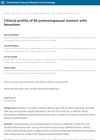 December 2020 in “Current Sexual Health Reports”
December 2020 in “Current Sexual Health Reports” Finasteride can have lasting negative effects on brain function and behavior by disrupting neurosteroid production.
 January 2014 in “European Geriatric Medicine”
January 2014 in “European Geriatric Medicine” A postmenopausal woman's virilization was caused by a rare ovarian tumor that was hard to detect but was successfully treated with surgery.
 December 2013 in “Open Access Macedonian Journal of Medical Sciences”
December 2013 in “Open Access Macedonian Journal of Medical Sciences” A woman's excessive hair growth and high testosterone were caused by a rare ovarian tumor, which was successfully treated with surgery.
 October 2023 in “European medical journal. Dermatology”
October 2023 in “European medical journal. Dermatology” Hair loss greatly affects quality of life, and dermatologists are crucial for proper diagnosis and treatment.
 8 citations,
July 2020 in “Journal of The American Academy of Dermatology”
8 citations,
July 2020 in “Journal of The American Academy of Dermatology” Patients with Lichen Planopilaris are more likely to have rosacea and skin cancer but less likely to have congestive heart failure, stroke, and glaucoma.
9 citations,
March 2008 in “PubMed” Low estrogen compared to androgen may cause female hair loss.
31 citations,
November 2009 in “European journal of dermatology/EJD. European journal of dermatology” Experts made a guide to help doctors evaluate women with too much hair growth.
 1 citations,
September 2021 in “CRC Press eBooks”
1 citations,
September 2021 in “CRC Press eBooks” Frontal Fibrosing Alopecia is a hair loss condition mainly affecting postmenopausal women, with unclear causes and various clinical patterns.
November 2014 in “PharmaTutor” Finasteride may help postmenopausal women with hair loss but is not effective for all and should be used cautiously in premenopausal women.
 April 2019 in “International Journal of Research in Dermatology”
April 2019 in “International Journal of Research in Dermatology” Most women with hirsutism have mild symptoms and often experience acne, menstrual irregularities, and obesity.
 January 2020 in “Revista da Sociedade Portuguesa de Dermatologia e Venereologia”
January 2020 in “Revista da Sociedade Portuguesa de Dermatologia e Venereologia” Frontal fibrosing alopecia in Brazil mostly affects postmenopausal women, often linked with hypothyroidism and eyebrow hair loss.
 2 citations,
September 2019 in “Acta Cardiologica”
2 citations,
September 2019 in “Acta Cardiologica” Women with non-classic congenital adrenal hyperplasia have higher risk for heart and metabolic problems.
 70 citations,
February 2012 in “Human Reproduction”
70 citations,
February 2012 in “Human Reproduction” Many young women who donate blood have hormonal disorders like excess male hormones and PCOS.
 119 citations,
November 2009 in “Human Reproduction”
119 citations,
November 2009 in “Human Reproduction” Women with PCOS and higher androgen levels are more likely to have fatty liver disease.
 28 citations,
February 2011 in “Clinical Endocrinology”
28 citations,
February 2011 in “Clinical Endocrinology” Women with PCOS have unhealthy changes in their cholesterol particles that are not related to their body weight.

Women with female pattern hair loss may have a higher risk of metabolic syndrome.
 33 citations,
January 2015 in “Journal of Cosmetic Dermatology”
33 citations,
January 2015 in “Journal of Cosmetic Dermatology” Familial frontal fibrosing alopecia affects premenopausal women too, and early diagnosis is important, but no proven medication exists yet.
 17 citations,
November 2018 in “Dermatology”
17 citations,
November 2018 in “Dermatology” Most patients with frontal fibrosing alopecia had facial bumps, with Hispanic/Latino and premenopausal women being more affected, suggesting a more severe condition.
 7 citations,
June 1994 in “Journal of The American Academy of Dermatology”
7 citations,
June 1994 in “Journal of The American Academy of Dermatology” Obesity may contribute to female hair loss by increasing male hormone levels that affect hair follicles.
 3 citations,
May 1990 in “Journal of Steroid Biochemistry”
3 citations,
May 1990 in “Journal of Steroid Biochemistry” Some women with excess hair growth have a hormone condition that can't be diagnosed by blood or urine tests alone.
 7 citations,
January 2018 in “International Journal of Trichology”
7 citations,
January 2018 in “International Journal of Trichology” Taking 5 mg/day finasteride can cause side effects in women with hair loss, but these are usually mild and fade over time, making the treatment beneficial in the long run.
 83 citations,
April 1992 in “Clinical Endocrinology”
83 citations,
April 1992 in “Clinical Endocrinology” Having enough iron improves the effectiveness of a specific hair loss treatment in women.
 June 2023 in “Faculty Opinions – Post-Publication Peer Review of the Biomedical Literature”
June 2023 in “Faculty Opinions – Post-Publication Peer Review of the Biomedical Literature” Bicalutamide mesotherapy improved hair density in women with hair loss and was well received.
22 citations,
January 2019 in “Climacteric” Oophorectomy lowers testosterone and estrogen levels in both premenopausal and postmenopausal women, with postmenopausal women still producing significant testosterone.
 74 citations,
July 2010 in “The Journal of Clinical Endocrinology & Metabolism”
74 citations,
July 2010 in “The Journal of Clinical Endocrinology & Metabolism” Treatment of acromegaly can improve women's reproductive health issues caused by hormonal imbalances or tumors.
 32 citations,
January 1990 in “Clinical Endocrinology”
32 citations,
January 1990 in “Clinical Endocrinology” Women with female pattern hair loss have higher levels of certain androgens, suggesting increased androgen exposure to hair follicles.
November 2020 in “AACE clinical case reports” A woman's severe male hormone excess was caused by a small, hard-to-find ovarian tumor.
 108 citations,
January 2003 in “Fertility and Sterility”
108 citations,
January 2003 in “Fertility and Sterility” Flutamide may slightly improve hair loss in women, but finasteride does not work.
 1 citations,
May 2013 in “Journal of the Egyptian Women's Dermatologic Society (Print)”
1 citations,
May 2013 in “Journal of the Egyptian Women's Dermatologic Society (Print)” PSA could be a marker for hyperandrogenism in women, but more research is needed.
May 2021 in “Journal of the Endocrine Society” Female pattern hair loss severity is linked to physical signs of high androgens, not blood hormone levels.
























